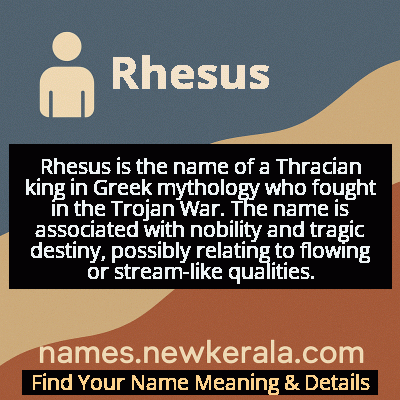Rhesus Name Meaning & Details
Origin, Popularity, Numerology Analysis & Name Meaning of Rhesus
Discover the origin, meaning, and cultural significance of the name RHESUS. Delve into its historical roots and explore the lasting impact it has had on communities and traditions.
Name
Rhesus
Gender
Male
Origin
Greek
Lucky Number
9
Meaning of the Name - Rhesus
Rhesus is the name of a Thracian king in Greek mythology who fought in the Trojan War. The name is associated with nobility and tragic destiny, possibly relating to flowing or stream-like qualities.
Rhesus - Complete Numerology Analysis
Your Numerology Number
Based on Pythagorean Numerology System
Ruling Planet
Mars
Positive Nature
Generous, passionate, energetic, and humanitarian.
Negative Traits
Impulsive, impatient, moody, and can be overly emotional.
Lucky Colours
Red, maroon, scarlet.
Lucky Days
Tuesday.
Lucky Stones
Red coral, garnet.
Harmony Numbers
1, 2, 3, 6.
Best Suited Professions
Military, sports, philanthropy, leadership roles.
What People Like About You
Courage, energy, leadership, generosity.
Famous People Named Rhesus
Rhesus of Thrace
Mythological King
Legendary Thracian king who fought in Trojan War with magnificent white horses
Rhesus (play character)
Theatrical Figure
Title character in ancient Greek tragedy traditionally attributed to Euripides
Rhesus monkey namesake
Scientific Reference
Species that gave name to Rh blood factor, indirectly honoring mythological king
Name Variations & International Equivalents
Click on blue names to explore their detailed meanings. Gray names with will be available soon.
Cultural & Historical Significance
The name's cultural significance expanded dramatically in the 20th century when it became indirectly associated with one of modern medicine's most important discoveries. The Rhesus macaque monkey, named after the mythological king, was used in research that led to the identification of the Rh blood factor. This created an extraordinary cultural bridge spanning millennia—from Homeric epic to contemporary healthcare. The name thus embodies the continuing relevance of classical culture while demonstrating how ancient references can acquire completely new meanings in modern scientific contexts.
Extended Personality Analysis
Individuals named Rhesus are often perceived as carrying an air of classical nobility combined with intellectual depth. The name suggests someone who is thoughtful, strategic, and perhaps somewhat tragic in their worldview—reflecting the mythological king's story of great potential undermined by circumstances. They tend to be natural leaders who approach challenges with careful consideration, though they may sometimes struggle with timing or feel that opportunities don't align perfectly with their readiness. There's often a sense of destiny or special purpose about them, tempered by the understanding that external factors can intervene in the best-laid plans.
The rarity of the name contributes to a personality that is distinctive and memorable. Those named Rhesus often develop strong individual identities early in life, as they must frequently explain their unusual name to others. This can foster intellectual curiosity, particularly in classical studies, history, or sciences. They may exhibit a blend of traditional values and innovative thinking, seeing connections between past and present that others might miss. The scientific association with the Rh factor adds a layer of modern relevance, suggesting someone who bridges classical wisdom with contemporary understanding.
Modern Usage & Popularity
In contemporary naming practices, Rhesus remains an extraordinarily rare choice, typically selected by parents with strong interests in classical literature, mythology, or academic backgrounds. Its usage is almost exclusively confined to intellectual or artistic circles where classical references are valued and understood. The name has never entered mainstream popularity and doesn't appear in any national baby name databases or rankings. However, it maintains a niche appeal among classicists and those seeking names with deep historical roots and literary significance. The scientific connection through the Rhesus monkey and Rh blood factor gives it some modern relevance that occasionally inspires use in medically-inclined families. Current trends toward unique mythological names might slowly increase its visibility, but it remains what naming experts would classify as an 'ultra-rare scholarly name' with usage likely numbering in the dozens rather than hundreds globally.
Symbolic & Spiritual Meanings
Symbolically, Rhesus represents the complex interplay between potential and actualization, destiny and circumstance. The name carries the weight of classical tragedy—embodying the idea of magnificent resources that never fulfill their intended purpose due to intervening forces. It symbolizes noble intentions undermined by poor timing, making it representative of the human condition where preparation and capability don't always align with opportunity. The mythological king's story serves as a metaphor for how even the most promising beginnings can be cut short by external factors beyond one's control.
Additionally, Rhesus symbolizes the unexpected connections between ancient wisdom and modern science. The journey from Homeric hero to medical terminology demonstrates how classical references can acquire entirely new meanings across millennia. This makes the name symbolic of intellectual continuity and the way knowledge transforms while maintaining connections to its origins. It represents the bridge between humanities and sciences, showing how mythological concepts can find practical application in completely unexpected contexts, thus embodying the unity of different forms of human understanding.

